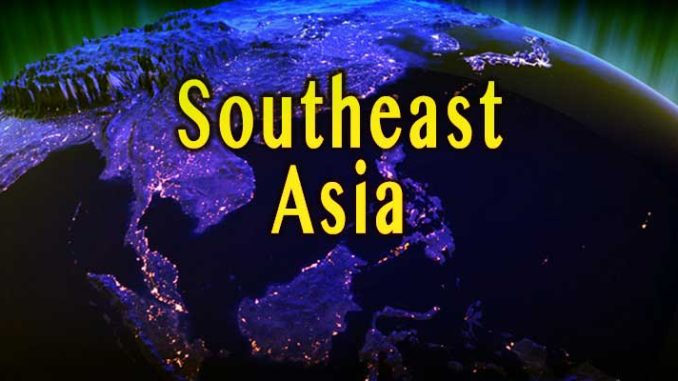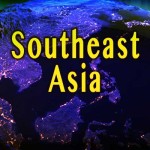
Thank you very much, Acharn Giles. This is great. First thing I want to say is this: listening to these four excellent and stimulating presentations, I was particularly struck by one thing that came out of Acharn Pasuk’s wonderful talk. She raised a question which is really important and interesting: Under what conditions can people like Thaksin appear? Was a Thaksin possible 10 years ago or 20 years ago? And that question can be asked, of course, for the Philippines. I mean, what are the conditions under which anybody not a movie star-type, or a second-rate economist, or so forth can become president of the Philippines?
The same question applies in a way to Malaysia and Indonesia – is Badawi only possible after Mahathir? Is he only possible when a certain economic system has been in place for 20 years? To talk about leaders as if they came out of the blue, as if they descended from the sky – here’s the leader or the statesman or the CEO – is really only half the issue. The other half is the conditions that make such people emerge. I think Acharn Pasuk made a very strong argument that Thaksin is the product of the crisis of 1997. I think this is something that is extremely important.
What Francis also could have said was that 1997 was very important in Malaysia because Mahathir had the “leadership” to make a very striking exception to the general rules of international liberal finance capitalism. He simply shut the door temporarily on Malaysia, saying: “You can’t take your money out at least until I let you.” This elicited screams from the international financial world, but actually he turned out to be right and Malaysia came through the 1997 financial crisis much better than Thailand, the Philippines, and Indonesia – precisely because Mahathir had the nerve to face down the international community, so-called. And Badawi has inherited that. So if you go back and think about what the various panelists have said, it is good to raise Acharn Pasuk’s questions: Under what conditions can he or she appear, and what conditions must she or he disappear?
Now the second thing I want to remind you of is something which I am sure most of you understand perfectly well. But it is important that you take a concept like CEO and ask yourself the difference between a state and a corporation. A chief executive officer is a corporate term and what it means, of course, is that the chief executive officer, who is an appointee of the Board of Directors, has the authority – provided he satisfies his shareholders and Board – to direct the company in a pretty authoritarian manner. He is authorized to dismiss people, to fire people, to close down plants, to open new ones, to undertake negotiations of all kinds.
The point about the corporation CEO is that the aims of the corporation are quite explicit. The aim is the expansion and conservation of profits. That’s it. And therefore the rights of the people who are employed are quite limited. They may have some pension rights, etc., but basically they are simply employees. They are not citizens. And they will do what they are told because they have no choice – they either leave, or they’re demoted, or they’re dismissed.
Citizens are obviously not employees. You cannot dismiss, as it were, the citizenry of Thailand or fire the population of Indonesia. So the idea of Thaksin’s that the company is a country and the country is a company, is frankly – if you don’t mind my saying so, please do not be offended – ridiculous. It’s just silly.
The interesting thing though – and here is what I wanted to call your attention to, what has not really been discussed in the presentations – is that the conditions for leadership can be compared to the corporation if we look at one problem that faces the political leader in any country, especially in places with traditions like Thailand, the Philippines, and Indonesia. You can have all the ideas in the world, you can manipulate all the images you want. But in the long run – it’s not really a long run, it’s a short run – the state leader has to be able to get his work done. And instruments for that are not the citizenry. The crucial factor is always the state bureaucracy. If you want to make the comparison with the employees of the company, the right comparison would be the employees of the state.
Now there are obviously huge differences. But first of all, I was delighted and amused by a statement by Prime Minister Thaksin this morning which struck me as an absolutely perfect illustration of his mindset. He said, and I am quoting from the notoriously unreliable Bangkok Post: “I am so sick and tired. I am so tired of firing people and transferring them.” Well, it’s transferring and firing people. But actually, of course, what he is talking about are not ordinary people; he is talking about karatchikaan, he is talking about state officials.
And you can see something very nice in this for, in fact, the crucial difference between state employees and corporate employees is that state employees are politically defined, typically they have tenure for life, and they cannot be dismissed except for extremely heinous offenses. And that is one reason why state officials – at least the low ones – are content to be badly paid, because they know they can’t be dismissed. Even if the pay is bad, they will be there till they’re old and they will get a pension.
So the problem always for state leaders is if the bureaucracy knows that its members cannot be fired – really fired – and that the worse that can happen to them is to be suspended or transferred, then the bureaucracy has enormous powers of inertia. It has enormous possibilities which every state leader in the world knows. Bureaucracies may not be very good at doing something energetically, but bureaucracies are very good at slowing things down, stopping things, blocking things, obstructing things, if these things are not in the bureaucracy’s long-term or even short-term interest.
You have to remember also that bureaucrats start in one ministry or agency or another, and typically their whole careers are in that ministry. That is, by the time they get to the point where they might get fired, as it were, or transferred, they’ve been in that ministry for a long time. They know exactly how it works; they know all its secrets; they know all its cliques and so forth. And they do not want to be transferred. If you are in the Ministry of the Interior and somebody says: “Why don’t you move to the Ministry of Agriculture?” you’d respond: “Why?” There is really nobody there that you know, you have no long experience there. So all kinds of inertia are built into bureaucratic systems everywhere. The bureaucracies/bureaucrats will carry out executive orders up to a certain point, especially when a new leader has just come into power. But as time passes, their willingness to do what they are told diminishes. After all, they’ll still be there long after he is gone.
Furthermore – and this is something every leader has to worry about but perhaps Thaksin has to worry about it more than most – there is the problem of geographical distribution and the way it affects how bureaucracies respond to initiatives or directives from the top. The example I will give to you, and there are plenty of them in other parts of Southeast Asia, is the striking pattern you find in the Indonesian military. Those of us who have been studying the military have discovered that when young people enter it they find out very soon whether they are – in the long run – going to get promoted seriously and rapidly. The way they discover this is that they are transferred, or more likely, not transferred. That is, they are sent to be a lieutenant in the equivalent of – shall we say – Udon or Pitchanulok, and they discover ten years later that they are still in Udon and Pitchanulok.
One reason is that the cost of moving lower-level personnel around is very high. So the government or state machinery says: “Well, they’ve been ten years in Udon, why don’t they stay another ten years in Udon?” Whereas a minority of officials – military, police and so forth – go up quite fast and these people move quite rapidly because they are headed up the hierarchy. Basically a kind of two-tier bureaucratic structure exists – one in which the top people have an interest in moving rapidly, but people in the lower levels have no interest in moving. Because what they have discovered, as military people settling down in the small town at the local base, is that they can use their military authority, power, and resources to have their daughter marry the head of the local chao pho. Or they can organize businesses with the local hotel manager, and so forth.
What happens is that these people entrench themselves in the local scene. They become part of the local influential group. What is happening in Indonesia is that control by the top levels of the military over the bottom levels is very low indeed. Look, for example, at the war in Aceh. One of the reasons for the war is not that the central government or central military people wanted it, but they are – in a sense – the victims of the local militaries who have been there for years and years and years, who control the rackets in drugs, who control the rackets in illegal fishing and so forth and so forth. And it’s these people initially whom the Acehnese have rebelled against.
The problem is this: if you look at the south of Thailand – and Indonesia and I suspect the Philippines as well – one of the things that is very clear is the entrenchment of non-transferred, non-transferable officials. These are people the senior bureaucracy thinks of as the kiya – people who are not going anyplace, who are hopeless, and therefore we might as well transfer them to the south and hope they won’t come back. But the point is that it is precisely these lower level people who have no interest whatever in promoting or carrying out the agendas of the center. In fact, they have all kinds of reasons to resist them.
Those of you who follow the interesting pages that recount the trials and tribulations of Kam Lampu will recognize that all the people around him are sergeants, lieutenants, and low-level police people who all work for him. They don’t work for the state, although nominally, of course, they are employees of the state. This is an enormous problem for leaders everywhere – the basic resistance of the bureaucratic apparatus which is highly fragmented, too. Ministries do not coordinate with each other; intelligence agencies dislike and distrust each other.
It is perfectly clear that Thaksin has not the faintest idea of what is going on in the South. But it is also true that Megawati has very little idea of what is going on in Aceh or Papua. And probably the same is true of Arroyo regarding many parts of the Philippines.
A further problem for the leader – the Great Leader, shall we say – is another interesting aspect of bureaucratic culture. This is that bosses or senior people in bureaucracies expect a great deal of deference. After all, they spent 20 years earlier on deferring to somebody else and therefore it’s time that they be deferred to. And the culture of seniority – which is there in most bureaucracies – means that employees lower down have every incentive to tell the boss what he wants to hear. And the boss, even if he thinks the report is probably not true, is glad to have a report he can send further up the bureaucracy, and without causing any trouble.
There is a built-in tendency for the information that goes to the top of the bureaucratic machine, then to the Great or not-so-Great Leader, to be strongly biased in favor of good news. And this is also compounded by the bureaucratic culture of secrecy – that is, don’t tell any other ministry what we are doing because we might have trouble. Don’t even tell the Prime Minister what we’re doing because we might have trouble. So there are all these creative mechanisms inside the bureaucracy which make the actual implementation of reform or anything else – even if you wish to do it seriously – extremely difficult.
The point I’m trying make here is that the immediate antagonism of the state leader, especially somebody who fantasizes that he is the chief executive officer of a burisat (corporation) called Mung Thai, is that he is not dealing with ordinary employees. He is dealing with state officials. These are protected by tenure; they are protected by the fact that their low salaries have to be compensated for by moon-lighting, by corruption and so forth. You can go to offices in Indonesia and the Philippines at 10:00 in the morning and half of the officials are not even there. They are moonlighting somewhere else. So how can they get anything done? They are protected by the culture of secrecy; they are protected by the culture of ministerial specialization; they are protected by a culture of various kinds.
A further aspect of this problem which I want to emphasize is the enormous expansion of this army of officials in the last 50 years. I do not have the figures – I am sure Khun Pasuk will certainly know for Thailand, Paul will know for the Philippines, Francis will know for Malaysia, and we might want to ask them to give these. The fact is that the bureaucracy in Indonesia today is 50 times larger than it was at the end of the colonial period, while the population of Indonesia has only increased by a little over 4 times. There are millions and millions and millions of these officials who go their own way, who Megawati or Suharto himself really have no idea what they’re up to. There was no way one person could manage this. And in fact, even at the end of the Suharto period, it was pretty clear already that things were coming apart. It wasn’t just the Asian financial crisis. There were visible signs that all kinds of people inside and outside the bureaucracy were basically doing their own thing.
So the enormous size of the bureaucracy – which is really very difficult to control – is another huge problem which is growing all the time. I was struck some weeks ago when I saw in the unreliable Bangkok Post that Thaksin was so desperate because he could not fire people that he was offering large sums to people to retire – to get them out of there. But if you want to pay, you have to pay an enormous amount of money to get even, say 50,000 Thai officials to retire early. And there is no guarantee that their spaces will not be filled up pretty rapidly later on. So the gigantic size of these bureaucracies makes leadership extremely difficult.
So it is striking the way Thaksin deals with people like Kamnan Po (Somchai Khunplum, an influential businessman in Chonburi province) – the only way he can deal with people like Kam Lampu and his army of lieutenants, captains, police people and so forth – is basically to threaten him with extra-legal power. I will finish you off in the courts! I will make sure the court punishes you unless you cooperate! Cooperation means “get out of my way. I am not gonna have you mess with any of my friends who want to do big construction projects in Pattaya. You’re not going to have any hand in my casino and so forth.” He can do this with one or two people, but there will be repercussions even to that.
I think that is probably enough, except to say this: when you talk about state leadership in relationship to the centralization of power, you have to think not just geographically – which is important – but also in terms of informal and formal power. That is, how does the state deal with people like Kamnan Po, how does it deal with people like the popular leader Thai leaders who had a lot of support but not inside the state bureaucracy? How does it deal with people like Khun Somchai Nilapaijit who is not inside the bureaucracy?
What is striking in many of these cases – in Indonesia, the Philippines, and so forth – is that the solution is actually outside the law. It is outside the bureaucracy. That is, the people who kill people like Theis and Sumchay are in fact officials, but – and this is nice homage to the idea of what the European state is like – they feel it necessary to take off their uniforms when they do the killing. Thank you.
Giles Ji Ungpakorn: I think there are a number of issues that have come out of the various talks; some of them are contradictory and people may wish to explore them. For example, Paul Hutchcroft mentions that weak political parties and poverty result in a democratic deficit. In Thailand, the government is attempting to deal with poverty with a clear political program. But this is a threat to civil liberties and human aspirations according to Acharn Pasuk. So what is the answer to this democratic deficit?
There is also the comparison between Malaysia, where there is obviously an authoritarian basis for an attempt to clean up government, and Indonesia, where Vedi Hadiz describes very well that authoritarian governments have the opposite effect. They produce corrupt political systems and mediocracy.
There is also the question that Vedi half-raised: Are the interests of the elite served by having strong political parties with strong platforms? Or can they be served by having strong political parties with just patronage and no political platforms? He also mentioned the complaints of business people who did not know who to bribe. I think that is worth bearing in mind as well.
Ben has questioned whether or not the CEO-style of administration is really effective given the nature of the bureaucracies of many countries. And Vedi asked, if we cannot rely on the present set up to provide decent leadership, who can we rely on? Where is the hope? Vedi also talked about a number of his friends and colleagues who have been co-opted by the present system. Well, we can draw a parallel with the people of the October 10 revolution in Thailand who have also been co-opted by the Thai Rak Thai government.
These are a number of debating points or strands which I have drawn out of the various talks. Other people may wish to raise other questions. So I now invite contributions from the floor.
 Pasuk Pongphaichit on Thailand
Pasuk Pongphaichit on Thailand
 Francis Loh Kok Wah on Malaysia
Francis Loh Kok Wah on Malaysia
 Paul Hutchcroft on The Philippines
Paul Hutchcroft on The Philippines
 Benedict Anderson on Southeast Asia
Benedict Anderson on Southeast Asia
Kyoto Review of Southeast Asia. Issue 6 (March 2005). Elections and Statesmen


